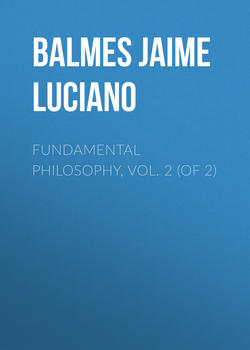Читать книгу Fundamental Philosophy, Vol. 2 (of 2) - Balmes Jaime Luciano - Страница 1
BOOK FOURTH.
ON IDEAS
CHAPTER I.
CURSORY VIEW OF SENSISM
Оглавление1. Having spoken of sensations, we come now to ideas. We must, however, before making this transition, inquire if there be in our mind ought else than sensation, if all the inward phenomena which we experience be ought else than sensations transformed.
Man, when he rises from the sphere of sensations, from those phenomena which place him in relation with the external world, meets a new order of phenomena, of whose presence he is equally conscious. He cannot reflect upon sensations without being conscious of something more than sensation; nor on the recollection or the inward representation of sensations, without discovering something distinct both from the recollection and from the representation.
2. According to Aristotle, there is nothing in the understanding which has not first been in the senses; and the schools have for long ages re-echoed this thought of the philosopher: nihil est in intellectu quod prius non fuerit in sensu. The order, therefore, of human knowledge, is from the external to the internal. Descartes pretended that we ought to invert this order, and proceed from the internal to the external. Malebranche, his disciple, went farther, and was of opinion that the understanding, enfolded in itself, should hold only the least possible intercourse with the external world. According to him, no atmosphere is so fatal to intellectual health as that of the world of the senses; sensations are an inexhaustible fountain of error, and the imagination is an enchantress only the more dangerous because she has fixed her dwelling at the very portal of the intellect, which, with her seductive beauty and gorgeous ornaments, she hopes to rule at her pleasure.
3. Locke strove to rehabilitate the old Aristotelian maxim, joined, however, to the criterion of observation: besides sensation he admitted only reflection, but he taught that the mind was endowed with innate faculties. His disciple, Condillac, not satisfied with this, taught that all the actions of our mind were simply sensations transformed: instead of distinguishing with Locke two sources of our ideas, the senses and reflection, he thought it more exact to admit only one, as well because reflection is in its root only sensation, as because it is rather the channel by which ideas originating in the senses pass, than their source.
Judgment, reflection, desires, and passions are in Condillac's estimation nothing else than sensation transformed in various modes. It seemed to him, therefore, very idle to suppose the mind to have received immediately from nature the faculties with which it is endowed. Nature has given us organs which show us by pleasure or pain what we ought to seek or to avoid; but here she stops, and leaves to experience the task of leading us to contract habits and finish the work she has commenced.1
4. In view of this system, in which not even natural faculties are conceded to the soul, and those which it does possess are considered as only simple effects of sensation, it is worthy of remark how soon its author contradicts himself; for, almost in the same breath, he professes to be an occasionalist, and pretends that the impressions of our organization are nothing more than the occasion of our sensations. Can there be a natural faculty more inexplicable than that of placing one's self in relation with objects which do not produce sensations, but are only the occasion of their production. If such a faculty as this be conceded to the mind, why may we not admit others? Is not that a very singular natural faculty which perceives by means of causes operating only occasionally? In this case, is there not attributed to the mind a natural faculty of producing sensations on occasion of organic impressions, or is it not supposed to be an immediate relation with another and superior being which produces them? Why may not this internal activity, this receptivity, apply itself to ideas? Why must not other innate faculties be conceded to the mind? And why does he pretend not to suppose them, when his whole argument is based upon the supposition of their existence?
Hostile as he professes to be to hypotheses and systems, Condillac is eminently addicted both to systems and hypotheses. He imagines an origin and a nature of ideas of his own, and to them he insists that every thing must conform. To give a better idea of Condillac's opinions, and to combat them at once successfully and loyally, we will briefly analyze the groundwork of his Treatise on Sensations, the book on which he most prides himself, and in which he flatters himself to have given to his doctrine its highest degree of clearness and certainty.
1
Traité des Sensations. Préface.
